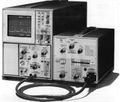7J20: Difference between revisions
No edit summary |
No edit summary |
||
| Line 14: | Line 14: | ||
}} | }} | ||
The '''Tektronix 7J20''', which only appears in the 1975 catalog, is a "rapid scan" optical spectrometer for the 250 nm to 1100 nm region. | The '''Tektronix 7J20''', which only appears in the 1975 catalog, | ||
Rapid scan means that it can capture the spectrum quickly enough to show spectral changes at temporal resolution of a few milliseconds. | is a "rapid scan" optical spectrometer for the 250 nm to 1100 nm region. | ||
Rapid scan means that it can capture the spectrum quickly enough | |||
to show spectral changes at temporal resolution of a few milliseconds. | |||
The instrument is based on a [https://en.wikipedia.org/wiki/Monochromator Czerny-Turner Monochromator], | The instrument is based on a [https://en.wikipedia.org/wiki/Monochromator Czerny-Turner Monochromator], | ||
in essence a narrow slit followed by a [https://en.wikipedia.org/wiki/Diffraction_grating diffraction grating]. | in essence a narrow slit followed by a [https://en.wikipedia.org/wiki/Diffraction_grating diffraction grating]. | ||
A [https://en.wikipedia.org/wiki/Vidicon vidicon tube] scans the optical spectrum and produces a periodic electric signal which is then displayed by the scope mainframe. | A [https://en.wikipedia.org/wiki/Vidicon vidicon tube] scans the optical spectrum | ||
and produces a periodic electric signal which is then displayed by the scope mainframe. | |||
[[File:7J20-principle.jpg | thumb | 400px | center | Operating principle (click to enlarge) ]] | [[File:7J20-principle.jpg | thumb | 400px | center | Operating principle (click to enlarge) ]] | ||
The spectrometer is packaged in two enclosures linked by an umbilical cable. | The spectrometer is packaged in two enclosures linked by an umbilical cable. | ||
The 7J20 is a 2-wide plug-in for [[7000-series scopes]] containing the sweep timing and mainframe interface circuits. | |||
The external enclosure is labeled "J20". | |||
It has controls for the optical components (grating, filters etc.) on one side and an input aperture on the other. | |||
The internal vidicon horizontal scan voltage corresponds to wavelength, | |||
but not in a linear way. | |||
To provide a linear nm/div horizontal display on the 7000-series mainframe, | |||
the vidicon horizontal scan signal is passed through a function generator IC, | |||
the [[155-0106-00]], | |||
which implements an interpolated lookup table. | |||
Inside the 7J20, there are 40 trimmer potentiometers that allow the lookup function to be tweaked | |||
so that the horizontal scale of the system is accurate. | |||
The 7J20 is very rare. According to Dennis Tillman, ''Best estimate is ~40 were actually built.'' | The 7J20 is very rare. According to Dennis Tillman, ''Best estimate is ~40 were actually built.'' | ||
Revision as of 16:17, 20 July 2018
The Tektronix 7J20, which only appears in the 1975 catalog, is a "rapid scan" optical spectrometer for the 250 nm to 1100 nm region. Rapid scan means that it can capture the spectrum quickly enough to show spectral changes at temporal resolution of a few milliseconds.
The instrument is based on a Czerny-Turner Monochromator, in essence a narrow slit followed by a diffraction grating. A vidicon tube scans the optical spectrum and produces a periodic electric signal which is then displayed by the scope mainframe.

The spectrometer is packaged in two enclosures linked by an umbilical cable. The 7J20 is a 2-wide plug-in for 7000-series scopes containing the sweep timing and mainframe interface circuits. The external enclosure is labeled "J20". It has controls for the optical components (grating, filters etc.) on one side and an input aperture on the other.
The internal vidicon horizontal scan voltage corresponds to wavelength, but not in a linear way. To provide a linear nm/div horizontal display on the 7000-series mainframe, the vidicon horizontal scan signal is passed through a function generator IC, the 155-0106-00, which implements an interpolated lookup table. Inside the 7J20, there are 40 trimmer potentiometers that allow the lookup function to be tweaked so that the horizontal scale of the system is accurate.
The 7J20 is very rare. According to Dennis Tillman, Best estimate is ~40 were actually built.
Key Specifications
| Spectral range | 250 nm to 1100 nm |
|---|---|
| Resolution (Grating A) | ≤4 nm in a 400 nm span (selectable 300-700, 400-800, 500-900, 600-1000, or 700-1100 nm |
| Resolution (Grating B) | ≤0.4 nm in a 40 nm span continuously variable through the spectral range |
| Slit | 10 to 5000 μm wide (1-2-5 sequence), 10 mm high |
| Filters | ND1, ND 2, 500 nm monopass, 800 nm monopass, UV block (≤400 nm), UV pass (250-330 nm), open (no filter) |
| Scan | 10 or 20 ms base sweep, 50 to 1000 ms (1-2-5) settings run successive 20 ms sweeps up to the selected integration time |
| Display span | Grating A, 40, 20, 10 or 4 nm/Div ; Grating B, 4, 2, 1 or 0.4 nm/Div |
Price
$12,000 in 1975 ($57,000 equivalent in 2018)
Links
- 7J0 in operation @ VintageTek Museum (YouTube)
Pictures
-
7J20 (plug-in part) in 7633 mainframe
-
7J20 plug-in part and J20 spectrometer connected (catalog picture)
-
7J20 with J20 in measurement setup (catalog picture)


